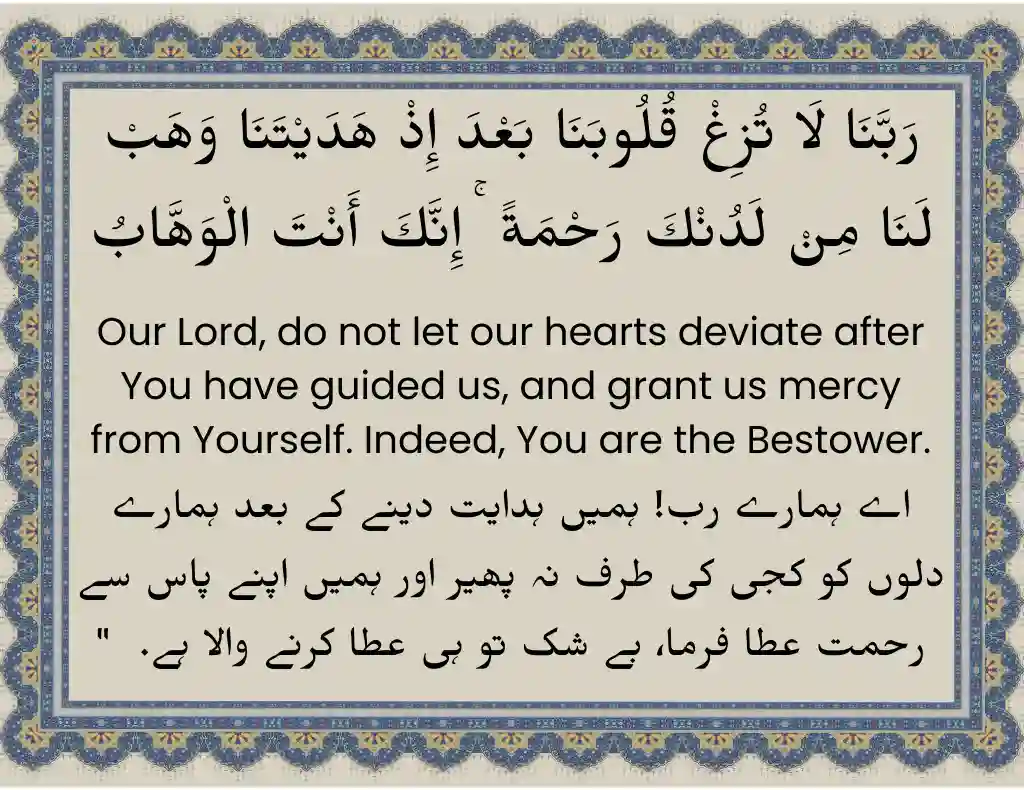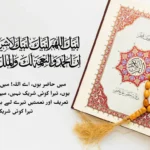The Quran contains countless supplications (duas) that provide solace and guidance for believers. Among these, the heartfelt plea, Rabbana La Tuzigh Quloobana, holds profound significance. This dua, found in Surah Aal-e-Imran (3:8), is a supplication for steadfastness, divine guidance, and protection from straying after receiving Allah’s mercy.
Let’s delve into the meaning, context, and significance of this beautiful dua with its Arabic text, Urdu, and English translations.
| La Yukallifullahu Nafsan Illa Wus’aha- Al-Baqarah |
| Hadith- Allahumma Inni As’aluka Al Jannah |
| Hadith- Innamal A’malu Binniyat |
| Qurani dua- Rabbi La Tazarni Fardan |
Arabic Verse: Rabbana La Tuzigh Quloobana
Full Verse in Arabic:
رَبَّنَا لَا تُزِغْ قُلُوبَنَا بَعْدَ إِذْ هَدَيْتَنَا وَهَبْ لَنَا مِنْ لَدُنْكَ رَحْمَةً ۚ إِنَّكَ أَنْتَ الْوَهَّابُ
English Translation:
“Our Lord, do not let our hearts deviate after You have guided us, and grant us mercy from Yourself. Indeed, You are the Bestower.”
Urdu Translation:
“اے ہمارے رب! ہمیں ہدایت دینے کے بعد ہمارے دلوں کو کجی کی طرف نہ پھیر اور ہمیں اپنے پاس سے رحمت عطا فرما، بے شک تو ہی عطا کرنے والا ہے۔”
The Significance of This Dua
- A Request for Firmness in Faith:
After being guided to the truth, believers seek Allah’s help to remain firm and not fall into misguidance or confusion. - Acknowledgment of Allah’s Mercy:
The dua highlights that true mercy and guidance come from Allah alone, emphasizing reliance on Him. - Allah as Al-Wahhab (The Bestower):
The verse ends with an acknowledgment of Allah’s attribute as the ultimate giver of mercy, guidance, and blessings.
Key Themes of the Dua
- Guidance and Misguidance: This verse reminds us that Allah is the source of guidance. We must constantly seek His help to stay on the straight path.
- Dependency on Allah: It reflects complete dependence on Allah’s mercy for spiritual well-being and success.
- Protection from Deviance: The dua emphasizes the importance of asking Allah to keep us firm in faith and protect us from doubts or distractions.
How to Incorporate This Dua in Daily Life
- Recite During Salah: Include this dua in your prayers, especially during sujood (prostration), as it is a moment of closeness to Allah.
- Morning and Evening Supplications: Start and end your day by reciting this dua to seek steadfastness throughout.
- In Moments of Uncertainty: Use this supplication whenever you feel spiritually weak or lost.
Benefits of Reciting Rabbana La Tuzigh Quloobana
- Strengthens Faith: Regular recitation instills a sense of reliance on Allah and deepens one’s connection with Him.
- Enhances Clarity: It clears doubts and fortifies the heart against temptations or misguidance.
- Earns Divine Mercy: Calling upon Allah as Al-Wahhab invites abundant mercy and blessings.
FAQs
Rabbana La Tuzigh Quloobana” means, “Our Lord, do not let our hearts deviate after You have guided us, and grant us mercy from Yourself. Indeed, You are the Bestower.” It is a plea for Allah’s guidance and protection from spiritual misguidance.
This supplication is found in Surah Aal-e-Imran (3:8) of the Quran. It is a dua made by those firmly grounded in knowledge, seeking Allah’s mercy and guidance.
You can recite this dua during prayers, especially in prostration, or include it in your daily morning and evening supplications to seek Allah’s mercy and protection.
Conclusion
The supplication “Rabbana La Tuzigh Quloobana” is a heartfelt prayer that emphasizes the believer’s reliance on Allah for steadfastness and mercy. By understanding its meanings, reciting it sincerely, and incorporating it into daily life, one can stay firm in faith and draw closer to Allah’s blessings.
May Allah guide us all and keep our hearts firm on the straight path. Ameen.




